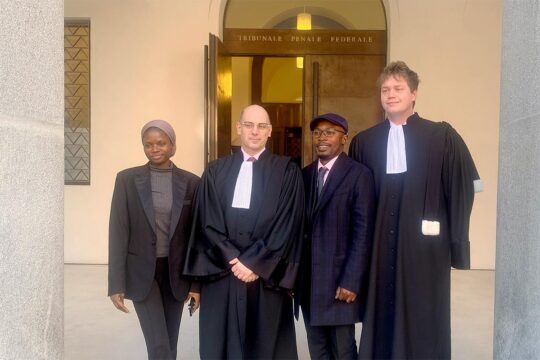Swiss citizens will vote on November 29 on a “responsible business” initiative that aims to make Swiss-based multinationals accountable for environmental crimes and human rights abuses like use of child labour committed abroad. If it does not pass, a watered-down counter-proposal adopted by parliament will come into force. Opponents support the counter-proposal and the federal government has recommended a “no” vote. Yet it still has a chance to pass.
The initiative was launched by a coalition of NGOs and is spearheaded by former Swiss Senator Dick Marty. (Full disclosure: Dick Marty is also a board member of Fondation Hirondelle, which manages Justice Info.) Campaigning on both sides has garnered considerable financial resources and revealed divides even within political parties and the business community. In an unusual move, Swiss churches have come out in favour. The campaign has been emotional, but it has not always been clear to the public exactly what is at stake. Here are some keys to understanding.
What does the initiative say?
“The Responsible Business Initiative wants multinationals to respect human rights and the environment in their activities abroad,” says the campaign website. It aims, via an amendment to the Constitution, to make them liable in Swiss courts for any harm caused in this respect. “When multinationals pollute drinking water or destroy entire regions, they must be held accountable for the harm caused by their subsidiaries,” it says. People abroad who have suffered harm caused by Swiss companies would be able to sue for damages in Swiss civil courts.
If the initiative passes the popular vote (requiring an overall majority and in a majority of cantons), companies will be obliged to incorporate respect for human rights and the environment in all their business activities, including abroad. This due diligence requirement means they will have to review their business relationships and activities, identify potential risks to people and the environment. They must then take “effective measures” to address these risks and report in a transparent manner. If they have done this, a court may not be able to hold them liable.
Which companies would be affected?
The initiative applies, according to the organizers, to some 1,500 multinationals. “The initiative does not apply to Small and Medium-sized Enterprises (SMEs with up to 250 employees) unless they are in risk sectors such as the gold trade,” it says. Neither does it apply to suppliers, they add. It affects Swiss-based multinationals and their subsidiaries abroad.
What would be the standard of proof for civil suits?
The onus would be on victims to prove that they have suffered harm as a result of human rights violations or violations of international environmental standards, and that the multinational was responsible via its subsidiary. Even then, if the company can show that it has carried out the necessary due diligence, it may not be held liable for damages. “The obstacles in civil law procedures are quite considerable,” says the campaign website. “It is therefore clear that claimants would need the support of NGOs and lawyers” -- not to mention the high cost of court action in expensive Switzerland.
What do opponents say?
The “no” campaign has been spearheaded by powerful Swiss business federation économiesuisse, along with some centre-right and right-wing politicians, most notably Justice Minister Karin Keller-Sutter, who argues that this initiative goes too far and would jeopardize Swiss jobs. “These rules so extensive in terms of liability would be unique in the world,” she told a press conference in Bern in October. Swiss companies must already answer for damage they cause abroad, she argued, and this would threaten their international competitiveness. “The initiative thus threatens jobs and prosperity in Switzerland, but also the investments of Swiss companies in emerging and developing countries.” Opponents also say it would harm SMEs, overload the Swiss judicial system and “violate national sovereignty”.
What has the campaign been like?
Both sides have pulled out the stops, even amid a second wave of coronavirus infections. The “yes” campaign has been particularly pro-active with the public, via personal E-mails, requests for donations, flyers and posters in public places. Their campaign has appealed to emotions with a poster of a sad-faced girl child and stories of how Swiss multinationals like commodities trader Glencore and agro-tech company Syngenta have allegedly poisoned people in developing countries. And they have mobilized supporters to hang their orange campaign flags from balconies and railings. They have also accused the opposing side of spreading “misinformation”.
The “no” campaigners all agree that business should be “responsible”, but argue the methods. They have appealed to fears that this initiative could hit Swiss business and jobs, especially in an economy already threatened by the Covid-19 pandemic. A rather unusual and controversial recent contributor to their campaign was Burkina Faso’s Trade Minister Harouna Kaboré, who came to Switzerland to express fears that the initiative could have socio-economic consequences for his country. His visit was organized by Green Liberal (pro-business Green) MP Isabelle Chevalley, whose party supports the initiative but who has personally come out against it. She says it is difficult for Swiss companies to verify the use of child labour, for example, in countries like Burkina Faso and Côte d’Ivoire, and that the initiative would make such countries poorer by leading to disinvestment.
Will the initiative pass?
The latest opinion poll by the gfS Bern research institute for the Swiss national broadcast company conducted in the first half of November found 57% support for the initiative, down 6% from October, and 41% against. It found that support is particularly strong among women, in the French- and Italian-speaking regions and among the grassroots of left-wing parties. However, support for the initiative has been slipping since earlier in the year and particularly since the launch of the opposing campaign. A closer look at the latest polling results showed voters with links to centrist parties and those without any particular party preference changing sides to reject the initiative. Currently supporters of the initiative still have a majority but there are several indications showing a general trend towards a “No” vote. “This makes it tricky for pollsters,” GfS Bern researcher Martina Mousson told Swiss media. “But it is safe to say that the situation is too close to call.”
What happens if it doesn’t pass?
If the initiative fails to win a majority at the ballot box, a counter-proposal put forward by the Swiss Senate and finally adopted by parliament will come into force. In this, multinational companies would be required to report on issues such as human rights, the environment and corruption. There are also due diligence obligations regarding raw material extraction in conflict zones and child labour. The counter-proposal does not, however, include new rules on legal liability, which is the main bone of contention in this debate. Opponents of the initiative argue that the counter-proposal is a viable alternative and in line with European Union rules. But pro-initiative campaign leader Marty says “it does not give the injured party which suffers damage any opportunity to assert its rights. It is total impunity.”
Would this initiative set an international precedent?
Left-wing supporters of the initiative would like to see Switzerland as a moral compass in this field, rather than a place that turns a blind eye to its multinationals’ abuses abroad. Corporate responsibility has been the subject of much debate and legislative action in various countries, in particular since the UN adopted its Guiding Principles on Business and Human Rights in 2011. The laws passed or under discussion in different countries are not easily comparable, as they are based on different legal systems and approaches.
“The same principles are being imposed just about everywhere,” Marty argued in an interview with swissinfo.ch. “The European Union is currently drafting such a text, Britain has just made two decisions along the same lines; Germany is drawing up a draft that is very similar to ours and France already has a law in force.” He thinks the majority of Swiss companies behave correctly, but a minority cause untold damage. “We are not the only ones with problematic companies; there are lawsuits pending in Britain, Canada, the Netherlands and France,” says Marty. “But Switzerland is among the countries with the highest concentration of multinational company headquarters.”
Whether this initiative passes or not, it will no doubt cause some ripples both inside and outside Switzerland.






